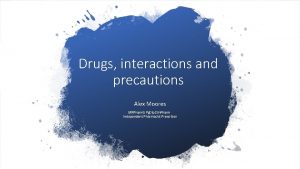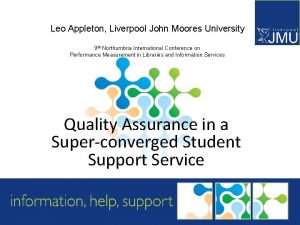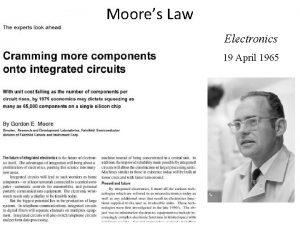The Police Knowledge Fund Project Liverpool John Moores











- Slides: 11

The Police Knowledge Fund Project Liverpool John Moores University; Merseyside Police and the Office of the Police and Crime Commissioner for Merseyside American Society of Criminology Conference, New Orleans, November 2016

College of Policing and HEFCE - The Police Knowledge Fund 1. Build sustained capacity amongst police officers and staff to understand, critique and use research 2. Embed or accelerate understanding of crime and policing issues, and evidence based problem solving approaches 3. Demonstrate innovation in building the research evidence base and applying it through knowledge exchange and translation across all levels of policing Inspired by the conviction that the more officers know about research, the more they engage with it, the more likely they are to use and embed research into their professional practice

The LJMU Police Knowledge Fund Project Embedding Evidence Based practice in Public Protection and Crime Prevention: A multi-disciplinary partnership • A clear twin-track focus on teaching and research • The Communities of Practice Model lies at the heart of the project; • • • Thematic focus on priority areas Blended Project Team of Advanced practitioners and Research fellows Integration of practitioner inputs Inter-disciplinary nature of the LJMU research inputs Knowledge Exchange Events • Proactive stakeholder engagement informs project outcomes • Together the works of the Co. Ps and the engagement with the Steering Group will drive research ventures

The LJMU Police Knowledge Fund Project From August 2015 through to March 2017 LJMU are working in partnership with the Office of the Police and Crime Commissioner for Merseyside (OPCC) and Merseyside Police. The programme focuses on the overarching OPCC priority Supporting Victims, Protecting Vulnerable People and Maintaining Public Safety, drilling down into the following priorities:

PG Cert Advanced Policing Studies Ultimately the key project deliverable is to deliver training to 72 police officers Two clear ambitions; 1. to develop the individual research skills set of students on the course through three modules coherently assembled to develop participant’s ability to identify, critically engage with, and reflect upon evidence-informed policing and criminal justice policy and practice 2. A second ambition of the programme - realised through the work-based research module - is to support students in constructing their own practice-related research projects …the programme’s ambition is to develop individual student’s profiles and to seek to generate manifest practice developments to stimulate others

PG Cert Advanced Policing Studies – Programme Structure Module Code Module Title Credits 7200 PS Evidence-Informed Policy and Practice 20 7201 PS Methods for Work-Based Research 20 7202 PS Work-Based Research Project 20 • Content and learning ambitions relevant to the sector • Develop the core skills and competencies of Level 7 Study • Scholarship informs curriculum delivery • Use of virtual learning environment to support programme

PG Cert Advanced Policing Studies – Programme Structure Module Skills Development Contribution to Policing Knowledge 7000 PS Evidence-Informed Policy and Practice Critical Reflection Literature review 7001 PS Methods for Work-Based Research SPSS Report Research Proposal 7002 PS Work-Based Research Project Presentation Report

Reflections on Developments in Evidence-informed Policy and Practice • There is a cultural shift taking place in the development of policing policy and practice with a renewed emphasis on ‘What Works’ Ø Following on from this is the idea of triangulation and collaboration on cross-cutting theme, raising questions about institutional independence and sovereignty • The changing landscape of policy as whilst crime levels are falling, the police workload hasn’t Ø Are the policing skills required different amidst the renewed emphasis on vulnerability • Can we re-imagine occupational culture and the creation of new working identities Ø The College promote the 4 e’s of Evidence (professional who understand); Efficiency (effective co-operation between partners); Equity (the role of procedural justice); and Empathy (heightened inter-personal skills) • The realisation that there a plethora of stakeholders and voices circulating around policing and of the need for officers to partake in this conversation

Practical challenges to realising these ambitions Manifest challenges to a fully-fledged and coherent culture of evidence-informed practice • The quality and depth of the research evidence available Ø The UK far behind US counterparts in generating resources of evidence • The time and space to develop knowledge and understanding Ø On-going professional service pressures mitigating against opportunities to reflect • The organisational need to respond to new emergent challenges as continually compromising the ability to plan and resource service provision Ø The police service increasingly being left to fill gaps left by the fracturing and devolving of a range of social service functions • The development of highly localised and increasingly diverse practices Ø PCC led initiatives (re)shaping models of practice and delivery

Broader challenges to realising these ambitions Broader challenges to work through in arriving at a more complete operation of evidence-based policing practice • The intuitively good and positive assessment of multi-agency working needs greater scrutiny Ø The need for a much more developed conversation about the capacity and utility of multiagency, partnership and integrated working • The need to anticipate occupational cultural changes and future proof service delivery ØA challenge is to consider the consequences of creating aspirational working cultures and champions of evidence based work • The fundamental challenge is to measure causation and to find the right mechanisms for capturing evidence ØA crucial element of that is the role and voice of officers in contributing to research agendas

The Key learning to take forward • In generating evidence it is important not to underestimate the importance of generating clear practice goals and objectives Ø Interventions their impact and projects need clear anticipated/predicted outcomes to be able to judge • The production, form, and availability of research-informed knowledge is crucial Ø How information feeds into the practice setting and how it is packaged is almost as crucial as measures designed to judge its credibility • The need for continued and informed debate and dialogue about what forms evidence can take and the need to continually reflect upon and challenge the evidence-base ØA role for researchers, police personnel and other stakeholders to think broadly about the production and implementation of evidence-informed practice





















